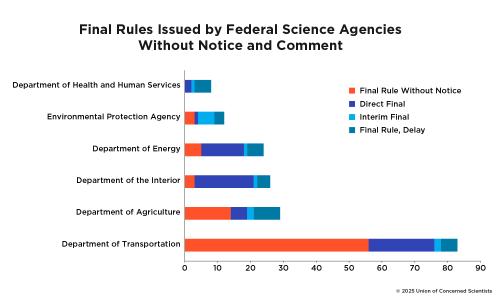The Trump administration is systematically attacking a wide range of public health, environmental, and safety rules. By law, federal agencies must notify the public about potential rule changes and give them the opportunity to make comments on those changes. But in many cases, the Trump administration is evading that legal requirement.
In the first six months in office, roughly 600 final rules were issued across six key science agencies. In 182 of these rules, the administration bypassed the public notice and comment period, cutting the public out of the process of shaping rules that affect their health and safety and our planet. This undermines the principles of accountability and transparency that should be part of our democracy.
Downloads
Citation
Minovi, Darya, and Alexander Choiniere. 2025. Access Denied: How the Trump Administration Is Eliminating Public Input. Cambridge, MA: Union of Concerned Scientists. https://doi.org/10.47923/2025.15979
